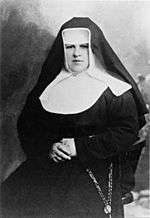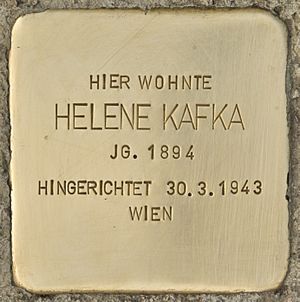Maria Restituta Kafka facts for kids
Quick facts for kids Blessed Maria Restituta Kafka SFCC |
|
|---|---|
 |
|
| Virgin and martyr | |
| Born | Helene Kafka 1 May 1894 Husovice, Margraviate of Moravia, Austria-Hungary |
| Died | 30 March 1943 (aged 48) Vienna, Nazi Germany |
| Venerated in | Roman Catholic Church |
| Beatified | 21 June 1998 by Pope John Paul II |
| Feast | 30 March, 29 October (in the archdiocese of Vienna) |
Maria Restituta Kafka (born Helene Kafka, 1 May 1894 – 30 March 1943) was an Austrian nurse of Czech background. She was also a religious sister in the Franciscan Sisters of Christian Charity. She was executed by the government in Nazi-run Austria because she stood up for her beliefs. Today, she is honored as a virgin and martyr in the Catholic Church. Pope John Paul II declared her "Blessed" in 1998.
Contents
Life Story of Maria Restituta
Early Years and Becoming a Sister
Helene Kafka was born in Husovice near Brno on May 1, 1894. She was the sixth daughter in her family. When she was two years old, her family moved to Vienna, the capital city. There, she grew up in a community with many Czech people.
As a young girl, Helene worked first as a housemaid. Later, she became a salesgirl in a tobacco shop. In 1913, she started working as a nurse at the municipal hospital in the Lainz area of Vienna.
While working as a nurse, Helene met the Franciscan Sisters of Christian Charity. She joined their group the next year, at age 20. She was given the religious name Maria Restituta, named after a martyr from the 4th century. After completing her training and making her first promises to the group, Sister Restituta went back to work at Lainz Hospital. She stayed there until 1919. While working, she encouraged "holistic medicine," which means caring for the whole person, not just their illness.
In 1919, after World War I, Sister Kafka was moved to a hospital in the town of Mödling. She eventually became the head surgical nurse there.
Standing Up to the Nazis
The Mödling hospital was affected when Germany took over Austria in 1938. This event was called the Anschluss. Sister Kafka openly spoke against the new Nazi government. She called Hitler a "madman" and said she couldn't stay quiet.
When a new part of the hospital was built, Sister Kafka followed Catholic tradition. She hung a crucifix (a cross with Jesus on it) in every room. The Nazi authorities demanded that the crosses be taken down. They threatened to fire her if she didn't obey. But she refused to remove them. The crosses stayed, and Sister Kafka was not fired because her community said they couldn't find anyone to replace her.
Sister Kafka continued to speak out against the Nazi government. Several years later, a doctor who strongly supported the Nazis reported her. On Ash Wednesday in 1942 (February 18), Sister Kafka was arrested by the Gestapo. This was the secret police of Nazi Germany. She was accused of hanging the crucifixes and also of writing a poem that made fun of Hitler.
On October 29, 1942, she was sentenced to death by the Volksgerichtshof. This was a special Nazi court. Her crime was "favoring the enemy and planning high treason" (betraying her country). The authorities offered to let her go if she left her religious group, but she said no.
A request to spare her life reached Martin Bormann, a powerful Nazi leader. He said that executing her would "effectively scare" others who might want to resist the Nazis. Sister Kafka spent her last days in prison. She was known for taking care of the other prisoners there.
After her arrest, Sister Restituta Kafka spent over a year waiting for her execution. On March 30, 1943, she was beheaded (executed by guillotine) in Vienna. She was 48 years old.
Honoring Maria Restituta
On June 21, 1998, Pope John Paul II visited Vienna. During his visit, he declared Sister Kafka "Blessed." She was the first virgin martyr from Vienna to be recognized in this way.
Maria Restituta Kafka was the only religious sister formally sentenced to death in the area controlled by the "Greater Germanic Reich" (Nazi Germany and its annexed territories). On March 4, 2013, she was remembered in Rome. A special service was held at the Basilica of San Bartolomeo all'Isola. During the service, the Franciscan Sisters of Christian Charity gave the basilica a small cross that Sister Kafka had worn. This special item was placed in the chapel that honors martyrs of the Nazi era.
To honor Sister Restituta Kafka, the western part of Weyprechtgasse, a street near Mödling Hospital, was renamed Schwester-Maria-Restituta-Gasse. There is also a park named after her in her hometown of Husovice, called Park Marie Restituty. In September 2020, a church dedicated to her was built near where she was born.
See also
 In Spanish: María Restituta Kafka para niños
In Spanish: María Restituta Kafka para niños
 | Misty Copeland |
 | Raven Wilkinson |
 | Debra Austin |
 | Aesha Ash |


